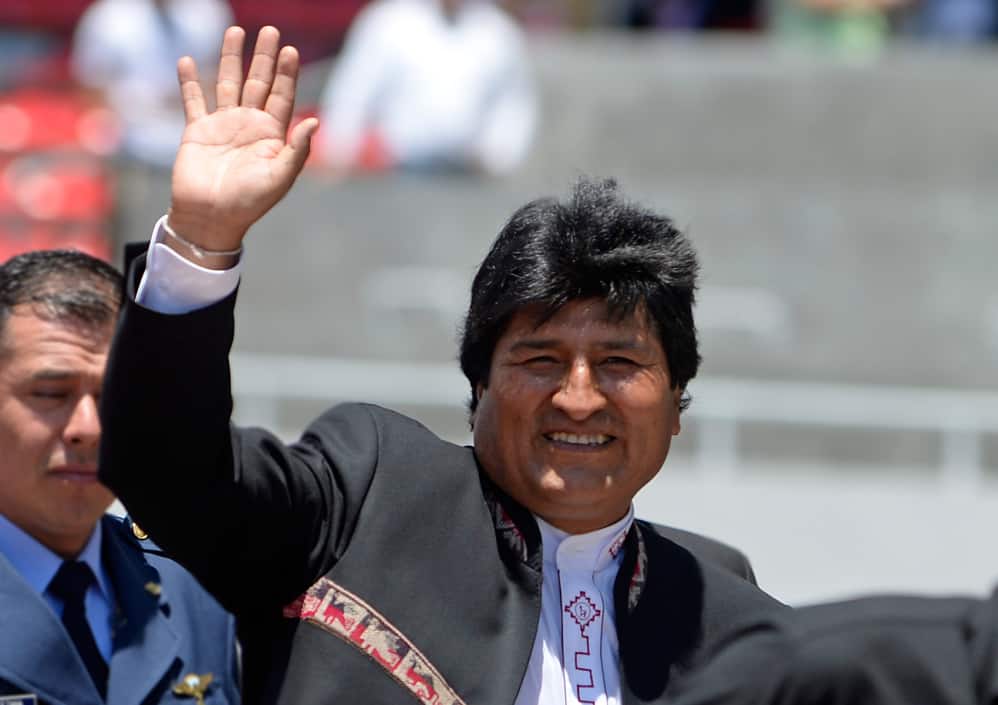Morales, Bolivia‘s first indigenous head of state, promised to respect the official results of Sunday’s vote on whether he can run for re-election to extend his time in office to 19 years.
But he insisted on waiting for full results to trickle in from rural areas where he has strong support.
“We are going to respect the results, whether it be a No or a Yes. We always have respected them. That is democracy,” he told a news conference.
“We are going to wait patiently for the final whistle from the electoral tribunal. We are optimistic,” added Morales, a keen football fan.
Morales, 56, wants to run for another five-year term when his current one ends in 2020, to continue a socialist program credited with improving the fortunes of poor indigenous groups.
Exit polls published by private media late Sunday indicated Morales narrowly lost the vote.
An Ipsos poll for ATB television said the “No” vote had 52.3 percent to 47.7 percent for “Yes.” A survey by Mori for Unitel television gave the “No” vote 51 percent to 49 percent.
Partial official results with nearly a third of votes counted on Monday showed about 62 percent for No and 38 percent for Yes.
Vice President Álvaro García said the early official count was based on returns in urban areas.
He warned the jubilant opposition to wait for all the results to trickle in from rural areas where Morales has strong support, and from voters abroad.
The Supreme Electoral Tribunal said it expected to have an official result with 90 percent of votes counted within two days.
Longest-serving president
Opposition figures celebrated their projected victory.
“Bolivia said no!” declared Santa Cruz Governor Rubén Costas.
Samuel Doria Medina — defeated twice by Morales in presidential elections — said: “We have recovered democracy and the right to choose.”
The early results “are showing strong support (for Morales) in the provinces, but in the main cities and even in the medium-sized ones, there is a strong ‘No’ vote,” said analyst Jorge Komadina.
However, “the forces of the opposition are scattered” and lack a single leader, he said. “They are a disparate grouping of leaderships and political intentions.”
Morales said ahead of the referendum that he was prepared to give up on a fourth term if voters rejected the bid.
“With my record, I can leave happily and go home content. I would love to be a sports trainer,” he was quoted as saying in an interview with Spanish newspaper El País.
Alleging ‘US hoax’
In January, Morales became the longest serving president since Bolivia‘s independence from Spain in 1825 — rare in a country that has seen numerous military coups.
He is one of a generation of Latin American leftist leaders who champion “21st-century socialism.”
He has overseen robust economic growth, but opponents accuse him of presiding over corruption and investing in flashy infrastructure projects at the expense of health and education.
Since first taking office, he has been strongly re-elected twice.
Bolivia‘s mineral- and gas-rich economy has more than tripled in size during his decade in office.
But his popularity has suffered over allegations that he used his power to influence deals in favor of CAMC, a Chinese engineering company that signed contracts worth $576 million with Bolivia.
The president rejected the allegations as “a hoax by the U.S. Embassy” to discredit him, and insisted he had “nothing to hide.”






